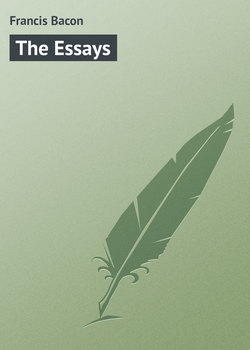The Essays

Реклама. ООО «ЛитРес», ИНН: 7719571260.
Оглавление
Francis Bacon. The Essays
Of Adversity
Of Ambition
Of Anger
Of Atheism
Of Beauty
Of Boldness
Of Building
Of Ceremonies, And Respects
Of Counsel
Of Cunning
Of Custom And Education
Of Death
Of Deformity
Of Delays
Of Discourse
Of Dispatch
Of Empire
Of Envy
Of Expense
Of Faction
Of Fame
Of Followers And Friends
Of Fortune
Of Friendship
Of Gardens
Of Goodness and Goodness Of Nature
Of Great Place
Of Honor And Reputation
Of Innovations
Of Judicature
Of Love
Of Marriage And Single Life
Of Masques And Triumphs
Of Nature In Men
Of Negotiating
Of Nobility
Of Parents And Children
Of Plantations
Of Praise
Of Prophecies
Of Regiment Of Health
Of Revenge
Of Riches
Of Seditions And Troubles
Of Seeming Wise
Of Simulation And Dissimulation
Of Studies
Of Suitors
Of Superstition
Of Suspicion
Of Travel
Of the True Greatness Of Kingdoms And Estates
Of Truth
Of Unity In Religion
Of Usury
Of Vain-glory
Of Vicissitude Of Things
Of Wisdom For A Man's Self
Of Youth And Age
A Glossary Of Archaic Words And Phrases
Отрывок из книги
It was an high speech of Seneca (after the manner of the Stoics), that the good things, which belong to prosperity, are to be wished; but the good things, that belong to adversity, are to be admired. Bona rerum secundarum optabilia; adversarum mirabilia. Certainly if miracles be the command over nature, they appear most in adversity. It is yet a higher speech of his, than the other (much too high for a heathen), It is true greatness, to have in one the frailty of a man, and the security of a God. Vere magnum habere fragilitatem hominis, securitatem Dei. This would have done better in poesy, where transcendences are more allowed. And the poets indeed have been busy with it; for it is in effect the thing, which figured in that strange fiction of the ancient poets, which seemeth not to be without mystery; nay, and to have some approach to the state of a Christian; that Hercules, when he went to unbind Prometheus (by whom human nature is represented), sailed the length of the great ocean, in an earthen pot or pitcher; lively describing Christian resolution, that saileth in the frail bark of the flesh, through the waves of the world. But to speak in a mean. The virtue of prosperity, is temperance; the virtue of adversity, is fortitude; which in morals is the more heroical virtue. Prosperity is the blessing of the Old Testament; adversity is the blessing of the New; which carrieth the greater benediction, and the clearer revelation of God's favor. Yet even in the Old Testament, if you listen to David's harp, you shall hear as many hearse-like airs as carols; and the pencil of the Holy Ghost hath labored more in describing the afflictions of Job, than the felicities of Solomon. Prosperity is not without many fears and distastes; and adversity is not without comforts and hopes. We see in needle-works and embroideries, it is more pleasing to have a lively work, upon a sad and solemn ground, than to have a dark and melancholy work, upon a lightsome ground: judge therefore of the pleasure of the heart, by the pleasure of the eye. Certainly virtue is like precious odors, most fragrant when they are incensed, or crushed: for prosperity doth best discover vice, but adversity doth best discover virtue.
For the first; there is no other way but to meditate, and ruminate well upon the effects of anger, how it troubles man's life. And the best time to do this, is to look back upon anger, when the fit is thoroughly over. Seneca saith well, That anger is like ruin, which breaks itself upon that it falls. The Scripture exhorteth us to possess our souls in patience. Whosoever is out of patience, is out of possession of his soul. Men must not turn bees;
.....
I knew another that, when he came to have speech, he would pass over that, that he intended most; and go forth, and come back again, and speak of it as of a thing, that he had almost forgot.
Some procure themselves, to be surprised, at such times as it is like the party that they work upon, will suddenly come upon them; and to be found with a letter in their hand, or doing somewhat which they are not accustomed; to the end, they may be apposed of those things, which of themselves they are desirous to utter.
.....